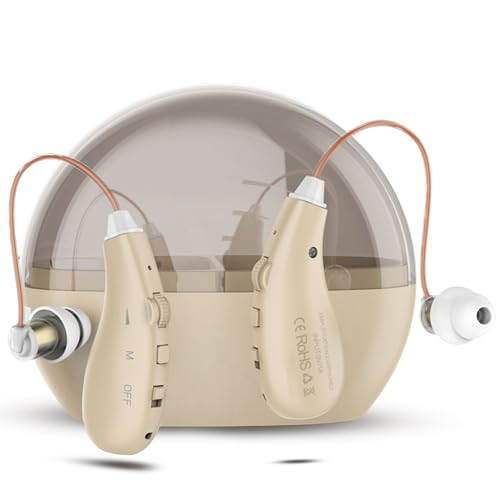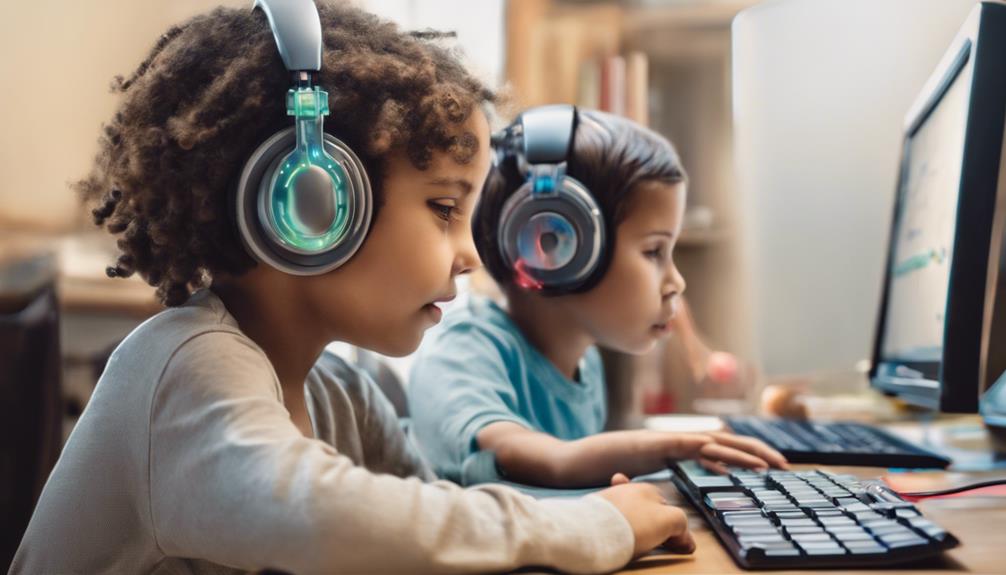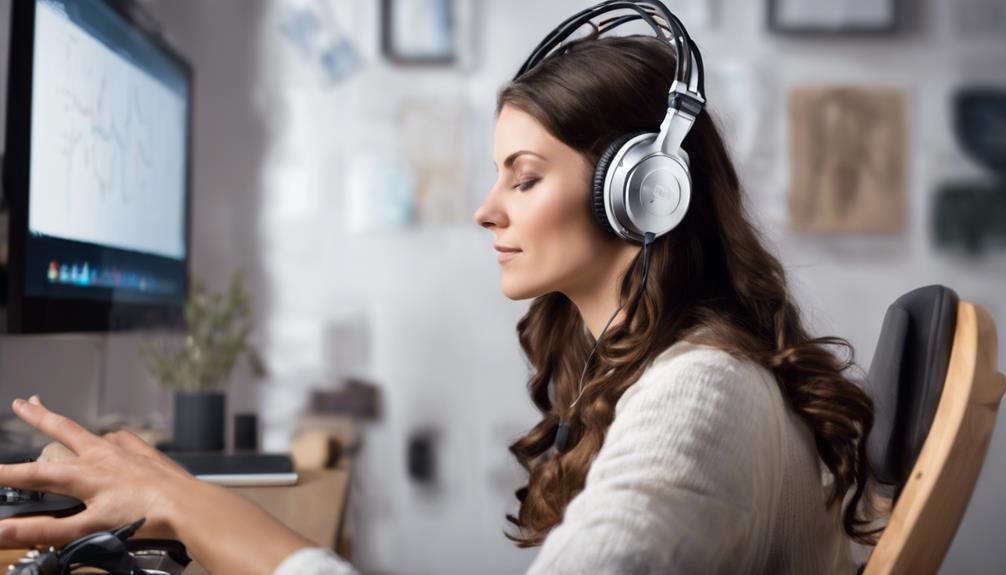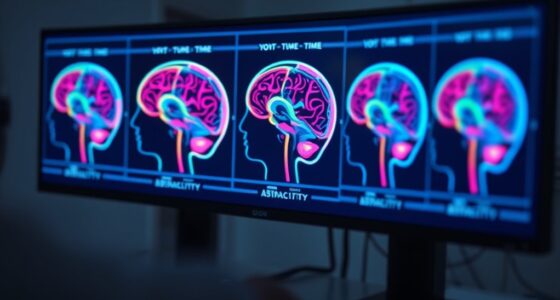In a recent case study, we witnessed a child with auditory processing difficulties making great strides after receiving listening therapy. The outcomes were encouraging, piquing our interest in the potential of this intervention for individuals dealing with comparable challenges.
As we explore the intricacies of listening therapy and its impact on auditory processing disorders, we aim to uncover how this innovative approach can revolutionize the way we support individuals in overcoming these challenges.
Join us in unraveling the layers of listening therapy and its transformative effects on auditory processing abilities.
Key Takeaways
- Listening therapy like The Listening Program addresses auditory processing challenges effectively.
- Daily sessions with acoustically modified music yield notable improvements in auditory skills.
- Early intervention with listening therapy enhances academic performance and social interactions.
- Research-backed efficacy supports the benefits of listening therapy in improving auditory processing.

Flaygo Pro Rechargeable Hearing Aids for Seniors with Hearing Loss, Smart Noise Reduction Chip for Crystal-Clear Sound, Ultra-Comfort Fit, Super-Mini & Auto On/Off
Restore Authentic Human Voices: Equipped with the Flaygo self-developed the newest digital chip, these hearing aids utilize adaptive...
As an affiliate, we earn on qualifying purchases.
Understanding Auditory Processing Challenges
Auditory processing challenges significantly impact an individual's ability to decode and remember oral information, especially in children with auditory processing disorder. Children facing auditory processing problems may struggle with listening, understanding, and recalling what they hear. These difficulties can hinder their academic performance, social interactions, and overall quality of life. Educational environments can be particularly challenging for these children, as they rely heavily on auditory cues for learning.
To support children with auditory processing challenges, strategies like emphasizing key words in sentences and providing sequencing assistance can be beneficial. Visual aids and environmental modifications, such as reducing background noise and using visual cues, can also help children better focus on auditory information. Early intervention is crucial in addressing these challenges, as it can prevent further academic delays and boost the child's confidence in their listening abilities. By understanding the unique needs of children with auditory processing disorders, we can create more inclusive and supportive learning environments for them.

WASOCA Hearing Aids for Seniors, Hearing Aids Rechargeable with Bluetooth, Hearing Aid APP Control, Hearing Amplifier for The Hearing Loss, Hearing Your Voice, FSA&HSA Eligible
Hearing Aid & Bluetooth 2 in 1 : Hearing aids realize hearing aid and Bluetooth function 2 in...
As an affiliate, we earn on qualifying purchases.
Benefits of Listening Therapy

Utilizing listening therapy, such as The Listening Program (TLP), can yield significant enhancements in auditory processing skills through daily acoustically modified music sessions lasting a minimum of 15 minutes. The benefits of listening therapy for individuals facing auditory processing challenges are substantial. Research indicates that completing programs like The Listening Program can lead to notable improvements in auditory processing abilities.
By engaging in specialized music sessions that target both bone conduction and air conduction through unique headphones, individuals can experience enhancements in their auditory processing skills. The effectiveness of The Listening Program is supported by evidence-based practice, showing positive outcomes in areas such as executive function, communication, and overall auditory processing.
This therapy is versatile, being utilized in various settings including clinics, hospitals, schools, military environments, VA facilities, and even in at-home settings. Embracing listening therapy can offer individuals struggling with auditory processing challenges a pathway to improved auditory skills and enhanced quality of life.

Banglijian Rechargeable Hearing Aid for Moderate to Severe Hearing Loss Ziv-206 for Seniors Adults with Noise Reduction Adaptive Feedback Cancellation-Two Types of Sound Tubes(Two Units)
EASY USE AND COMFORTABLE FEATURE: Banglijian is a professional hearing aid manufacturer and seller, which have produced a...
As an affiliate, we earn on qualifying purchases.
How Listening Therapy Works
Moving from the discussion on the benefits of listening therapy, let's now explore the mechanics of how this innovative approach operates to enhance auditory processing skills. Listening therapy functions by exposing individuals to acoustically modified music daily for a minimum of 15 minutes. This process involves utilizing specialized headphones that cater to both bone conduction and air conduction music training. An exemplary program like The Listening Program (TLP) is designed to support executive function, auditory processing, and communication skills. TLP is widely implemented across diverse settings including clinics, hospitals, schools, military facilities, VA centers, and homes. Research substantiates the efficacy of TLP in enhancing auditory processing abilities among individuals facing auditory processing challenges.
| Features | Description |
|---|---|
| Duration | At least 15 minutes daily exposure to acoustically modified music |
| Equipment | Specialized headphones for bone conduction and air conduction music training |
| Benefits | Supports executive function, auditory processing, and communication skills through programs like TLP |
| Application Settings | Utilized in clinics, hospitals, schools, military facilities, VA centers, and home environments |

Soundure Hearing Aids for Seniors, OTC Hearing Aids for People with severe Hearing Loss, Smart Noise Reduction Chips, Stand for 80h, One-Button Operation, Comfortable Wearing
Clearer Conversations in Daily Life: These hearing aids use digital noise reduction technology to make voices sound clearer...
As an affiliate, we earn on qualifying purchases.
Types of Listening Therapy Programs

Listening therapy programs offer various approaches tailored to individual needs, such as The Listening Program (TLP).
These programs have shown efficacy in enhancing auditory processing skills and communication abilities.
Research supports the benefits of completing listening therapy programs like TLP for individuals with auditory processing challenges.
Program Approaches
An effective approach to addressing auditory processing challenges involves the implementation of various types of listening therapy programs. When considering program approaches for auditory system enhancement and brain training, options include:
- The Listening Program (TLP): Utilizes acoustically modified music for auditory processing support.
- Specialized Headphones: Utilized in TLP for bone conduction and air conduction music training.
- Settings: TLP can be implemented in clinics, schools, and homes for convenience.
- Research Findings: Show significant improvements in auditory processing post TLP training in individuals aged 5-50.
These program approaches cater to language processing and overall auditory system enhancement, offering evidence-based hope for individuals with auditory processing challenges.
Efficacy and Benefits
After exploring program approaches for addressing auditory processing challenges, the focus shifts to examining the efficacy and benefits of various types of listening therapy programs in enhancing auditory system function and communication skills.
One prominent training program, The Listening Program (TLP), involves daily listening to acoustically modified music for at least 15 minutes using specialized headphones for both bone and air conduction music training. Research has shown significant improvements in auditory processing in individuals aged 5-50 after completing TLP training. This evidence-based practice is validated by research and implemented in settings like clinics, schools, and homes.
Completion of TLP training can lead to improved auditory processing abilities, which can benefit communication, social interactions, and emotional function by addressing processing deficits and enhancing auditory pathways.
Effectiveness of Listening Therapy

Studies have consistently demonstrated the effectiveness of listening therapy, particularly programs like The Listening Program (TLP), in significantly enhancing auditory processing skills across a wide age range of individuals with auditory processing challenges. This evidence-based practice has been crucial in improving outcomes for those struggling with auditory processing. Here are key points regarding the effectiveness of listening therapy:
- Listening therapy, such as TLP, involves daily sessions of modified music to enhance auditory processing abilities.
- Research has shown significant improvements in auditory processing skills in individuals aged 5-50 after completing listening therapy programs like TLP.
- The effectiveness of listening therapy extends beyond enhancing auditory processing skills to improving communication, social interaction, and emotional functioning.
- Utilizing specialized headphones for bone and air conduction music training, listening therapy is widely used in various settings for individuals with auditory processing challenges.
The documented success of listening therapy programs like TLP underscores the importance of incorporating such interventions into treatment plans for individuals with auditory processing difficulties.
Incorporating Listening Therapy Into Treatment

When incorporating listening therapy into treatment, we focus on specific therapy techniques tailored to individual needs and monitor patient progress closely.
By customizing the therapy to address auditory processing challenges, we aim to enhance executive function, communication skills, and social engagement.
The Listening Program (TLP) provides a structured framework that has shown significant improvements in auditory processing abilities based on research findings.
Therapy Techniques
Listening therapy, incorporating acoustically modified music and specialized headphones, is a key technique used to improve auditory processing in individuals facing challenges in this area. This therapy focuses on enhancing skills related to interpreting and processing auditory information.
Here are some essential elements of therapy techniques:
- Acoustically Modified Music: Tailored music is used to stimulate auditory pathways.
- Specialized Headphones: These facilitate bone conduction and air conduction music training.
- The Listening Program (TLP): Daily sessions support executive function, communication, and auditory processing.
- Research Findings: Studies show significant improvements in auditory processing abilities post-TLP training.
These techniques are widely applied in clinics, schools, and homes, benefiting individuals of various age groups with auditory processing challenges.
Patient Progress
In tracking patient progress with incorporating listening therapy into treatment for auditory processing challenges, improvements can be observed through enhanced tolerance to noise and increased ability to identify sentences in noisy environments.
Working with children facing auditory processing difficulties, we've witnessed significant advancements in their listening skills and auditory processing abilities. By integrating listening therapy interventions into their treatment plans, children with auditory processing disorder have shown enhanced auditory behaviors and improved listening capabilities, especially in challenging auditory environments.
Utilizing structured listening programs such as The Listening Program (TLP) has proven effective in supporting executive function, communication, and overall auditory processing in individuals with auditory processing disorder. Standardized tests like the SCAN test of auditory processing are valuable tools for evaluating patient progress and measuring enhancements in auditory processing skills.
Personalized Approaches to Listening Therapy

Tailoring interventions to address specific auditory system breakdowns is a key aspect of personalized approaches to listening therapy for individuals with auditory processing challenges. These approaches are designed to enhance a child's auditory skills through targeted skill-building exercises.
Strategies may include:
- Sound Distinction Exercises: Activities aimed at improving the ability to differentiate between similar sounds, enhancing phonological skills crucial for language development.
- Memory Enhancement Techniques: Techniques to boost auditory memory, helping individuals better retain and recall auditory information.
- Sequencing Tasks: Exercises focusing on the order of sounds or words, aiding in the comprehension of spoken language and improving sequencing abilities.
- Environmental Modifications: Adjustments to the listening environment to reduce auditory distractions and enhance focus during therapy sessions.
Enhancing Communication Skills Through Listening Therapy

To further advance the effectiveness of interventions for individuals with auditory processing challenges, it is crucial to focus on enhancing their communication skills through specialized listening therapy programs. Language Pathologists play a vital role in implementing these programs to address the specific needs of each individual. By incorporating structured auditory training like The Listening Program (TLP), significant improvements in auditory processing and communication skills can be achieved. The table below illustrates the benefits of enhancing communication skills through listening therapy:
| Benefits of Listening Therapy for Communication Skills | Description |
|---|---|
| Improved Auditory Processing Abilities | Enhanced ability to interpret and process auditory information. |
| Better Executive Function | Enhanced cognitive skills like decision-making and problem-solving. |
| Enhanced Social Interactions | Improved ability to engage in conversations and social settings. |
| Improved Emotional Well-being | Better emotional regulation and understanding of social cues. |
| Overall Communication Skills | Enhanced verbal and non-verbal communication abilities. |
Through these targeted interventions, individuals with auditory processing challenges can experience significant improvements in various aspects of communication, positively impacting their daily interactions and quality of life.
Future Trends in Listening Therapy

Advancements in listening therapy for auditory processing challenges are increasingly focused on personalized treatment plans tailored to individual needs and preferences. This shift towards personalized approaches is driven by the understanding that treating Auditory Processing Disorder requires targeted interventions to address specific deficits effectively.
Future trends in listening therapy are shaping up to be dynamic and innovative, with several key developments on the horizon:
- Technology Integration: Advancements in technology, such as virtual reality and interactive tools, are revolutionizing the field of listening therapy, enhancing the overall treatment effectiveness.
- Neuroplasticity Research: Ongoing research into the neuroplasticity of the brain in response to listening therapy is paving the way for novel interventions that leverage the brain's ability to reorganize and adapt, leading to improved outcomes.
- Interdisciplinary Collaboration: Collaborations between professionals in audiology, speech-language pathology, and neuroscience are driving the development of cutting-edge listening therapy techniques that are comprehensive and evidence-based.
- Holistic Approaches: The integration of holistic approaches, including mindfulness and sensory-based interventions, is emerging as a promising trend in enhancing the effectiveness of listening therapy for auditory processing challenges.
Frequently Asked Questions
How Do You Fix Auditory Processing Issues?
To fix auditory processing issues, we recommend seeking specialized listening therapy programs like The Listening Program (TLP). By engaging in daily sessions of listening to tailored music, individuals can enhance their auditory processing abilities.
Research indicates significant improvements in auditory processing following TLP training. This evidence-based approach not only supports executive function but also enhances communication and social-emotional skills.
It's crucial for individuals with auditory processing challenges to explore targeted therapies like TLP for improving their auditory skills.
What Are the Coping Skills for Auditory Processing Disorder?
We handle auditory processing challenges with strategies like noise-cancelling headphones for reducing distractions. Visual cues and preferred seating also assist in navigating tricky listening environments. Emphasizing key words and sequencing help individuals cope effectively.
Seeking professional interventions like speech-language therapy is beneficial. Focusing on managing frustration, building strengths, and compensating for weaknesses are crucial elements in coping with Auditory Processing Disorder.
What Tools Help Auditory Processing Disorder?
We've found that tools such as noise-cancelling headphones and personal frequency modulation systems can assist individuals with auditory processing challenges in managing background noise effectively.
Utilizing these tools has shown significant improvements in auditory processing abilities, aiding in communication, social interactions, and emotional functions.
The use of specialized headphones and technologies like The Listening Program has provided evidence-based support for individuals with auditory processing disorder, enhancing their overall quality of life.
What Are the 4 Types of Auditory Processing Disorder?
We can identify four types of auditory processing disorder:
- Auditory discrimination involves difficulty distinguishing similar sounds.
- Figure-ground discrimination is the struggle to pick out important sounds in noise.
- Memory challenges impact information recall.
- Sequencing difficulty involves understanding sound or word order.
These challenges can significantly impact communication, learning, attention, and social interactions.
Understanding the specific disorder type helps tailor interventions and support strategies.
How Does Listening Therapy Help with Auditory Processing Challenges?
Auditory therapy activities for listening can significantly improve auditory processing challenges. By engaging in activities such as music therapy, sound discrimination exercises, and auditory memory tasks, individuals can strengthen their listening skills. Listening therapy helps to retrain the brain to process and interpret auditory information more effectively, leading to improved communication and learning abilities.
Conclusion
In conclusion, exploring listening therapy for auditory processing challenges has shown promising results in improving sound distinction, memory, and sequencing skills for individuals with auditory processing disorders.
By incorporating personalized approaches and tailored support, individuals can enhance their communication skills and overall quality of life.
As we look towards future trends in listening therapy, it's essential to continue advancing interventions to help individuals overcome auditory processing difficulties and thrive in their daily lives.
Remember, the future is bright for those seeking to improve their auditory processing abilities.










